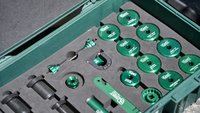Long time forum lurker, but wanted to comment on this as its right in my wheelhouse (I am a Forester in the Sea to Sky area). Also, I do not work in a timber harvesting or tree planting capacity, so I like to think I can be unbiased.
Big picture, herbicides really aren't that big of a deal in a forest setting (in contrast with the very heavy annual use they get in agriculture). Glyphosphate is one of the most studied chemicals ever, and while there are some studies linking it to increased cancer in humans, those are largely in people who interact with this chemical on a daily basis (landscapers, farmers, etc). This is very different from the often aerial helicopter spraying in a forestry application, where it occurs a few times early on in a new plantation. Glyphosphate isn't great for animals, but as long as the spraying guidelines are followed there is minimal risk.
HOWEVER: glyphosphate kills plants. That's its job. Specifically non-conifer, deciduous plants. The aim is to give the conifer plantings an advantage early on, so they can outgrow the competing deciduous plants. Naturally deciduous plants regrow much faster, and reduce conifer growth rates through competition. Since the goal of planting is to get a conifer forest established ASAP, herbicides are often used. A fact is that this dramatically reduces biodiversity in the forest for the first few years. However, once the conifers are established, typically the herbicide stops getting used, and the deciduous understory really bounces back. An important note that herbicide is not used that frequently, but in specific sites where the deciduous competition will be an issue for the conifer plantings. This is because it is very expensive to apply.
Focused on this BCTS Pest Management Plan (PMP). There is a lot of misunderstanding on this BCTS plan. It is a very large scale and broad landscaping plan. It only includes herbicide use as an option within the area it applies to. It does not identify specific areas for herbicide application, the total area for herbicide use, and the amount that this will be used. Ultimately it might not even be used at all, but its kept as an option in this plan as an optional tool in the toolbox. The actual use of herbicide is on a much, much smaller scale than this plan implies (think dozens of hectares at the site scale, vs 10,000s of hectares at the PMP level). Herbicide use is also highly dependent on site characteristics like ecology, access, and also economics, because herbicide is so expensive.
The biggest harmful effect of glyphosphate is it kills deciduous understory plants and promotes conifer stands, resulting in a reduction in biodiversity. The biodiversity typically bounces back a few years after application. This promotion of natural conifers is a key foundation of forestry in BC: this is why we tree plant, why people brush out the deciduous in plantations, why there are goats trained to eat deciduous (for real), and this is why we use herbicide. I think the real question isn't whether we should use glyphosphate or not, its whether we should be managing these forests so intensely for conifer growth.
Anyway, feel free to ask me anything about this our forestry in general.







